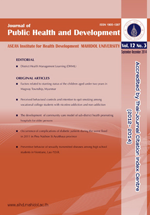Maternal knowledge, attitude and practices related to diarrhea in children aged less than five years in Kabarole district, Uganda
Main Article Content
Abstract
Diarrhea remains the leading cause of child mortality around the globe, being responsible for about 9.0% of all child deaths. Uganda remains among the 15 countries that account for almost three quarters of all deaths from diarrhea among under-five children. The disease is on the increase in Kabarole district. Data and information about maternal knowledge, attitude and practices on it remains scarce as no studies have previously been done. The objective of the study was to assess maternal knowledge, attitude and practices in relation to diarrhea among children under five years old in Kabarole district in Uganda.
A Community-based cross sectional study was carried out in Kabarole district in Uganda from December 2015 – January 2016. A sample of 367 subjects was randomly selected from from Rwimi Sub County and East Division. Data were collected using a structured questionnaire. Logistic regression was used to examine the associations between study factors and diarrhea occurrence.
Findings revealed that mean ages of mothers/care takers and under-five children were 28.9 years and 26.5 months respectively. Among mother/caretakers, 79.9% had formal education, and 61.4% had a household monthly income < UGX90, 000. Prevalence of diarrhea morbidity over a seven days period preceding the study was 33.2% while that over a 14 days period preceding the study was 48.6%. After adjusting for all possible confounder factors, it was found out that children aged ≥ 6 months (Adj. OR = 8.32, 95%CI = 2.42 – 28.54), children aged of 7 – 11 months (Adj.OR = 8.97, 95%CI = 3.25 – 24.75), poor level of practices by caretakers (Adj. OR = 29.67, 95%CI = 10.40 – 84.62) and moderate level of practices by caretakers (Adj. OR = 3.27, 95%CI = 1.16 – 9.17) were associated with diarrhea occurrence among under-five children.
Diarrhea prevalence among under-five children was high in Kabarole district. This study therefore recommends for appropriate behavioral change interventions to be developed and implemented for reducing diarrhea in children


